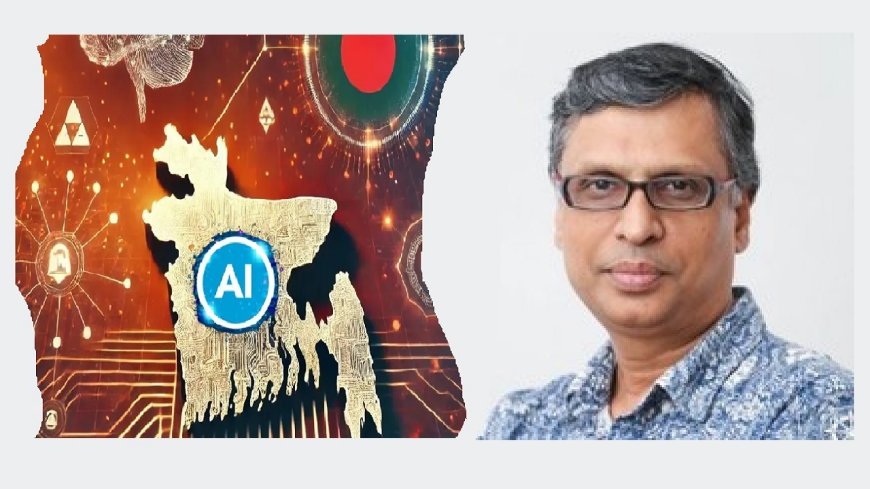Smartness, Selfishness, and the Silent Rise of AI: A Personal Reflection
Zakaria Swapan

Disclaimer: The views expressed in this article have been extracted from a write-up written in Bangla by Zakaria Swapan, a Technology Expert and do not reflect the position of Digital Bangla Media rather solely reflects the views of the author alone. This column is published as part of our policy of reflecting diverse perspectives without editorial interference. Any sense of grievance or agitation caused is entirely personal.
The author opens with a personal confession: a long-standing desire to fall in love with a “remarkably beautiful and smart woman.” While beauty is a widely understood concept, the real challenge lies in defining “smartness.” Many perceive fashion sense or grooming as signs of intelligence; some equate smartness with confident self-expression or the ability to argue coherently. Even graceful movement is sometimes perceived as a marker of smartness.
But the author's view of smartness is strikingly different.
“In my opinion, a person is smart if, while discussing a topic, they can instantly comprehend what I’m talking about and interpret it using their own domain knowledge.”
To illustrate, the author shares a scenario: suppose he expresses his long-held wish to learn ‘shuffle dance’ but could not find a good trainer and hence began learning from a robot. A nurse, upon hearing this, gleams with interest and says, “Really? Could that robot be used to serve patients? Perhaps entertain those who are depressed? Could it dance to cheer them up?” To the author, this is the mark of a smart nurse — someone capable of contextual understanding and imaginative application. “That’s the kind of person I’ve been looking for all along!”
Similarly, a smart woman might also dream of falling in love with a handsome and smart man — crafting her own definition of what “smart” means.
Transitioning from personal to philosophical, the author reflects on the inherent selfishness of human nature.
“Every human being is selfish — save for a few exceptions. Everyone thinks in their own way, expects in their own way. That expectation, at its core, is selfishness.”
From parental expectations to romantic desires and commercial ambitions, the author sees layers of selfishness interwoven into human relationships. True selflessness, he argues, is rare.
“I have found only one category of people who are truly selfless — the armed forces. This isn’t just about Bangladesh. It’s true for military personnel worldwide. They risk their lives not for themselves, but for others — for their country.”
He recalls moments abroad when he would salute groups of soldiers in uniform and silently think, “O brave ones, may you never become selfish.”
Contrasting this valor with social reality in Bangladesh, the author laments the heightened intensity of selfishness in his homeland, attributing it to the scarcity of resources.
“Due to our limited resources, we stoop lower for even a small gain. We can forcibly seize someone else's assets, sell them at a higher price with pride, and even kill if needed.”
This selfishness, according to the author, breeds constant conflict. Cooperation is rare, and mistrust prevails. Instead of striving to rise, people obsess over dragging others down.
“We never learned how to advance together by trusting each other. We learned how to get ahead by deceiving others — through lies, theft, and betrayal.”
Against this bleak backdrop, he introduces a beacon of hope: Artificial Intelligence.
“The world has entered the age of Artificial Intelligence,” the author writes, noting that while AI has been under development for over two decades, machines now surpass human knowledge. The combined knowledge of all doctors, scholars, and experts now resides within intelligent machines.
“In the past, when you faced a problem, you looked for an honest person to offer a solution — a good doctor or a skilled lawyer. Sometimes you found one, sometimes not. Now you can access the world’s best in an instant.”
Those familiar with platforms like ChatGPT understand the immense power of such tools, the author claims, and urges Bangladesh to view this as an opportunity. He sees AI as the country’s potential savior.
“The biggest weakness of Bangladesh lies in its people’s lack of smartness (as per my definition) and their limited knowledge. Gather 100 people in a room and you’ll find 98 of them are nearly ignorant. How do you plan or solve problems with such people?”
To bridge this gap, the author advocates for mass AI literacy — not just within universities or elite circles but among the general public: from youth to elderly farmers, from urban to rural.
“Just educate them about AI. The rest will be handled by the people and the machines.”
He concludes on a thought-provoking note, “This machine is not selfish. It has no expectations from you. It is smart and selfless — just the kind of partner I’ve been waiting for. Perhaps I’ll fall in love with a machine someday.”








































































































































































































